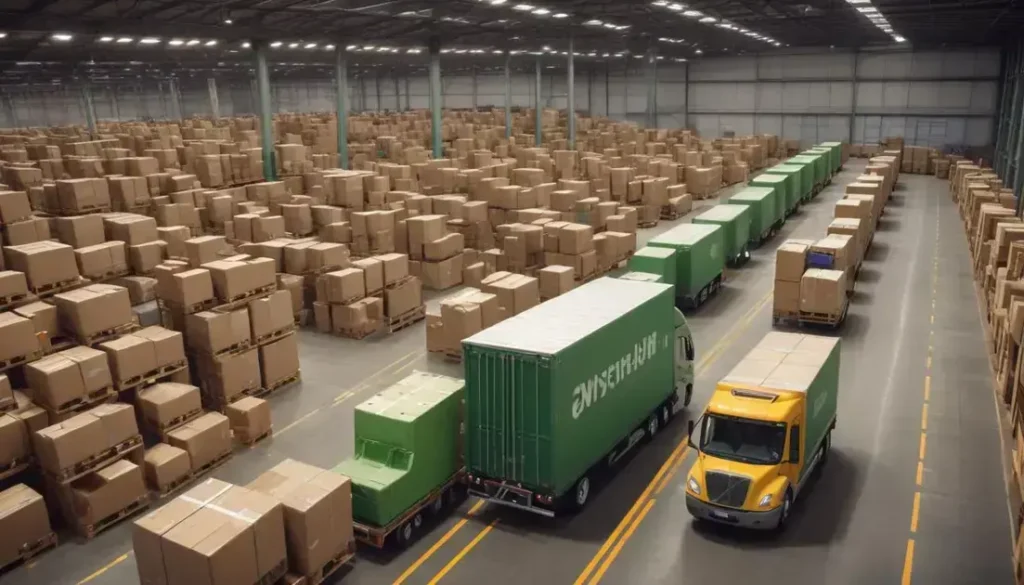Australian businesses face significant challenges such as regulatory compliance, rising operational costs, and the necessity for digital transformation, which require strategic planning and adaptation for sustainable growth in a competitive global market.
Tariff management is becoming crucial for Australian businesses. With Maersk’s innovative AI platform, exporters can tackle compliance and cost challenges effectively.
Introduction to Maersk’s AI Customs Platform
Maersk’s AI Customs Platform represents a significant advancement in the realm of trade compliance. By leveraging artificial intelligence, this platform streamlines customs processes, enabling Australian exporters to manage tariffs more efficiently. The platform offers features such as real-time updates and predictive analytics, which are crucial for ensuring compliance with regulatory requirements.
One of the major advantages of this platform is its ability to automate routine tasks associated with customs declarations. This not only reduces the risk of human error but also significantly accelerates the time it takes to clear goods at borders. With the creation of comprehensive data reports, businesses gain insights that help in strategic decision-making and operational efficiency.
Furthermore, the user-friendly interface allows exporters to access vital information swiftly, fostering a proactive approach to managing customs duties. This is particularly beneficial for small to medium enterprises that may not have extensive resources dedicated to compliance matters. Ultimately, the AI Customs Platform is poised to enhance the competitive edge of Australian businesses in the global market.
Impact of tariffs on Australian exporters
The impact of tariffs on Australian exporters is multifaceted, affecting various sectors including mining, agriculture, and manufacturing. Tariffs can increase the cost of goods, making it challenging for exporters to maintain competitive pricing in international markets. For businesses that rely heavily on exports, such as the beef and wine industries, these added costs can erode profit margins and hinder growth.
Additionally, fluctuations in tariff rates can lead to uncertainty, complicating financial forecasting for exporters. Predicting costs becomes increasingly difficult, which may deter investment or expansion plans. This volatility poses a threat not only to businesses but also to the overall economy, as reduced export activity can slow growth.
Another significant aspect is the potential impact on relationships with trading partners. High tariffs can strain diplomatic relations and lead to retaliatory measures that further complicate the trade landscape. Australian exporters must stay informed about changes in tariff regulations and assess strategies to mitigate risks, such as diversifying markets or investing in tariff engineering solutions.
Government support and guidance can also play a crucial role in helping exporters navigate these challenges. Resources such as export grants, advisory services, and trade agreements are essential for fostering resilience and enabling Australian businesses to thrive in a global marketplace.
Navigating complexities in customs compliance
Navigating the complexities in customs compliance is essential for Australian exporters. The constantly changing regulations require businesses to remain vigilant and informed. Failure to comply with customs requirements can lead to severe penalties, jeopardising shipments and impacting overall profitability.
Understanding the different components of customs regulations is crucial. This includes tariffs, duties, and documentation requirements that vary by product and destination. Australian exporters must ensure they have accurate classification of goods to avoid payment of incorrect tariffs, which could inflate costs unnecessarily.
Furthermore, technology plays a significant role in streamlining compliance processes. With platforms like Maersk’s AI Customs Platform, exporters can automate data entry, receive real-time updates on evolving regulations, and have access to essential compliance tools. This technological advantage can significantly reduce the burden on staff and allow for more focus on core business activities.
Training employees on customs compliance best practices is another vital step. Regular workshops and resources can enhance their understanding and capability, ultimately leading to smoother operations. By fostering a culture of compliance within the organisation, Australian exporters can mitigate risks and enhance their reputation in global markets.
Benefits of real-time tariff updates
The benefits of real-time tariff updates are significant for Australian exporters navigating the complexities of international trade. By receiving instant data on tariff changes, businesses can swiftly adapt their pricing strategies and maintain competitiveness in fluctuating markets.
Real-time updates facilitate timely decision-making. Exporters can avoid costly delays in shipments by proactively adjusting their operations in response to new tariffs. This agility not only preserves profit margins but also strengthens relationships with international partners who value reliability and responsiveness.
Moreover, real-time information minimizes the risk of compliance issues. With automatic alerts regarding changes in tariffs and regulations, exporters can ensure their documentation is always accurate. This reduces the likelihood of penalties or fines associated with incorrect tariff classifications.
Integrating real-time updates into business processes can also streamline supply chain management. A clearer understanding of upcoming tariff changes allows for better inventory control and logistics planning, decreasing overall operational costs. Ultimately, embracing technology to keep pace with tariff modifications enables Australian exporters to maximise opportunities while safeguarding their interests in global trade.
Reducing costs through AI technology
Reducing costs through AI technology is a strategic move for Australian exporters seeking to enhance their competitiveness in the global market. By automating routine tasks, businesses can significantly lower operational expenses while improving efficiency. AI solutions streamline processes, such as inventory management and logistics, enabling companies to allocate resources more effectively.
Moreover, AI analytics provides valuable insights into consumer behaviour and market trends, allowing exporters to make data-driven decisions. This predictive capability not only reduces waste but also optimises stock levels, resulting in lower holding costs. Effective utilisation of AI tools can lead to substantial savings and improved financial performance.
Integrating AI into supply chain management further contributes to cost reduction. With advanced algorithms, businesses can predict demand fluctuations and adjust their sourcing strategies accordingly. This minimises excess inventory and reduces the likelihood of markdowns on unsold products, ensuring that capital is used efficiently.
AI-driven platforms enhance decision-making by providing real-time data and analytics. As a result, exporters can respond swiftly to changes in tariffs or market conditions, safeguarding their profit margins. Embracing AI technology ultimately paves the way for Australian exporters to achieve sustainable growth while maintaining a competitive edge in the evolving landscape of international trade.
Sustainability and trade: A new era
Sustainability and trade are entering a new era as businesses increasingly recognise the importance of environmentally responsible practices. Australian exporters are now focusing on sustainable methods to meet both consumer expectations and regulatory demands. This shift not only enhances brand reputation but also opens up new market opportunities.
Trading sustainably involves adopting practices that minimise environmental impact, such as utilising renewable resources and reducing carbon footprints. This is especially pertinent for industries like agriculture and mining, where resource management can significantly affect ecological balance. By implementing sustainable practices, companies can differentiate themselves in a crowded marketplace.
The integration of sustainability into trade also promotes compliance with international standards and agreements, which are becoming stricter. Australian exporters who prioritise sustainability can better navigate these regulatory frameworks, avoiding penalties and enhancing their global competitiveness. Consumers are increasingly inclined to support brands that align with their values, making sustainability a key factor in purchasing decisions.
Furthermore, collaborations between governments, businesses, and stakeholders foster innovation in sustainable practices. Technology plays a significant role in developing solutions that advance sustainability goals while ensuring profitability. As Australia embraces this new era, embracing sustainability in trade is not just a choice; it is essential for long-term success and resilience in the global economy.
Future of global trade with AI support
The future of global trade is being reshaped by the integration of AI support into various commercial processes. As businesses embrace advanced technologies, AI is proving to be a game changer, enhancing efficiency, accuracy, and decision-making capabilities. Automation of routine tasks allows companies to focus on strategic initiatives that drive growth.
AI provides valuable insights by analysing vast amounts of data, enabling businesses to identify trends and make informed decisions based on real-time information. This predictive ability helps exporters anticipate market fluctuations and customer demands, ensuring they remain competitive on a global scale. Furthermore, AI facilitates improved logistics management, optimising routes and reducing shipping times.
Collaboration between AI systems and human expertise is critical. While AI offers analytical prowess, the insights generated must be interpreted and actioned by skilled personnel. This synergy ensures that businesses leverage AI technology to its fullest potential while retaining the human touch necessary for relationship-building and negotiations.
As AI continues to evolve, its role in global trade will expand, leading to more transparent and streamlined processes. Exporters who adapt to these changes will not only enhance their operational capabilities but also position themselves as leaders in an increasingly competitive landscape. Embracing AI is no longer optional; it’s essential for sustainable growth in international markets.
Challenges faced by Australian businesses
Australian businesses face a range of challenges that can impact their growth and sustainability. One significant issue is the ever-changing landscape of regulatory compliance. With strict regulations governing trade, environmental policies, and employee rights, businesses must stay informed and adapt quickly to avoid penalties.
The global economic climate also presents hurdles. Factors such as fluctuating exchange rates and international trade tensions can affect profitability. Australian exporters, for instance, often contend with tariffs imposed by foreign countries, which can disrupt pricing strategies and erode competitive advantages.
Another pressing challenge is the increasing cost of labour and resources. As the demand for skilled workers rises, attracting and retaining talent becomes more competitive and costly. This situation is exacerbated in sectors like technology and engineering, where the skill shortages are pronounced.
Moreover, digital transformation poses both opportunities and challenges. While technology can enhance efficiency, its rapid evolution can overwhelm businesses lacking the expertise to implement and manage new systems effectively. The investment in digital skills and infrastructure is crucial for staying relevant in a digitally driven economy.
To overcome these challenges, Australian businesses must foster resilience and adaptability, engaging in continuous learning and strategic planning. By doing so, they can navigate the complexities of the market and position themselves for success.
Conclusion and key takeaways
While a formal conclusion is not included, it is essential to highlight the key takeaways from the challenges faced by Australian businesses. These enterprises must navigate a rapidly changing regulatory environment that demands continuous adaptation. The ability to comply with regulations while remaining cost-effective is critical for success.
Furthermore, the global economic landscape presents its own set of challenges. Businesses must be prepared to manage issues such as fluctuating exchange rates and trade tensions, which can affect pricing and market competitiveness. Developing strategies to mitigate these risks is vital for maintaining profitability in international markets.
The rising costs of labour and resources also pose significant challenges. Companies are encouraged to invest in employee development and engage in workforce planning to attract and retain the necessary talent. A robust skilled workforce is fundamental to overcoming operational hurdles.
Finally, embracing digital transformation can position Australian businesses for future success. Adopting new technologies and fostering a culture of innovation will help businesses remain relevant and competitive. Ongoing assessment and strategic planning will be crucial as they navigate the complexities of the market.
In Summary: Navigating Challenges for Success
Australian businesses face many hurdles in today’s competitive environment. From adapting to regulatory changes to managing costs, the landscape is complex. It is crucial for businesses to stay informed and agile, embracing new technologies and strategies.
Investing in workforce development and fostering a culture of innovation will help companies attract and retain talent. Furthermore, businesses must leverage digital tools to improve efficiency and make data-driven decisions.
By understanding these challenges and acting strategically, Australian businesses can position themselves for growth and sustainability. Embracing change is not just necessary; it is vital for thriving in the global market.
By focusing on these areas, businesses can not only survive but thrive in an ever-evolving landscape. The journey may be challenging, but the rewards of resilience and adaptability can lead to a brighter future.
Frequently Asked Questions (FAQ)
What challenges do Australian businesses face today?
Australian businesses navigate a range of challenges, including regulatory compliance, rising operational costs, and the need for digital transformation.
How can investing in workforce development help my business?
Investing in workforce development attracts and retains talent, enhancing skills that drive productivity and innovation within your organisation.
Why is digital transformation important for businesses?
Digital transformation increases operational efficiency by streamlining processes, improving data management, and enhancing customer engagement.
What strategies can help mitigate the risks of fluctuating exchange rates?
Businesses can hedge their currency exposure using financial instruments and diversify their markets to reduce reliance on a single currency.
How can businesses stay informed about regulatory changes?
Regularly consulting industry organisations, legal advisors, and government updates can help businesses stay informed about changes in regulations.
What role does technology play in overcoming business challenges?
Technology provides tools and solutions that enhance efficiency, improve data analysis, and streamline operations, which are crucial for overcoming various business challenges.


